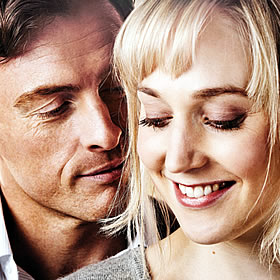The Real Thing
I thought it was going to be too clever by half, a criticism so often levelled at Stoppard and parodied in the character of Henry, the playwright. Was his writing the real thing or just or just the defensive manipulations of an expert wordsmith, obfuscating, confusing, keeping everything ambivalent. Or was Brodie? Henry compares the writer to a spring cricket bat. Words fly of the bat and can go for miles. They deserve respect, but is that the real thing or just the craft of make believe?
And in love, what is the real thing? Stoppard is a much greater teacher on the mysteries of love than any of the psychoanalysts; he shows us what it is like. Henry is arch Stoppard, graded, defended, cynical, witty, prompting Annie’s comment ‘You want to wait until it all goes wrong and then you will decide you were right all along.’
The script fizzes with insight and emotion. Hannah Morahan as Annie captures the barely contained lust, a dangerous impulsiveness, as she goads Henry on to take the risk that will prove he truly loves her. ‘Touch me! Anywhere! I dare you to. Do it now on the floor. Let them find us.’ And when she returns with the dips and gives him her finger to suck, the look on Henry’s face reveals just where that finger has been. It’s raw stuff. The shift from the thrill, the excitement to the most dreadful pain is expressed so well. So is there something about the thrill that just captivated Henry. ‘Once you have loved, can you ever do without it?’
There is a dreadful compulsion about an affair, the awful conflict, the compulsive danger of playing with fire, ‘All that lying.’ ‘Happiness expressed in banality and lust.’, passion fuelled by the fear and jealousy. ‘Why aren’t you jealous?’ It bothers me that you are never bothered’ Annie complains. Of course, if Henry were jealous, it would demonstrate the power she has over him. Exclusive love is colonisation’. And isn’t that the source of the excitement, the thrill of it all? Annie wants Henry to prove she is loved, is loveable; she is so insecure, she can only exist in her lover’s gaze. ‘The exclusive voracity of love.’
Henry eloquently explains being in love as colonisation, I write just for you. I write just to be worth your love. It has taken him over, subsumed all of the meaning in his life. He lives with Annie in their own bubble of happiness. ‘Love is knowing and being known’ So is being in love an enhanced image of self, air brushed and in soft focus. Aren’t lovers really in love with themselves, as seen through the gaze of the other. ‘When its there, you are happy and nice to know, but when its gone, you count for nothing and all you have is pain. So Henry is dependant, even though he fights it. They both are. They have given each other power over their lives, the power to destroy each other. Anything you think is right; what you want is right. This is the extent of the dependency. But human relationships cannot be confined as Annie says when she admits her infidelity – this is not a commitment, just a bargain – a deal and it gets complicated when you have an affair and enter into a deal with two people. Maybe being in love becomes a performance, an obligation that you have to act out, because the threat of loss is so great. It’s better to destroy the hope than to live a love that gives false joy.
As Annie says, ‘I have to chose whom I hurt more’ You are stronger, you can take it. But I love you, I’m yours. Henry finds it demeaning to be suspicious and jealous; he struggles to respond in what Stoppard calls ‘dignified cuckoldry’. The unwritten rule of a relationship seems to be to respect the other’s privacy. You must not trespass behind the make believe. You must not try to discover the real thing; the ambivalent attachment of most human relationships. ‘What free love is free of is love!’
The Real Thing was written in 1985 and has been playing at The Old Vic with Toby Stephens and Hannah Morahan as Henry and Annie. Stoppard tackles an intense and important topic with insight, wit and style.



